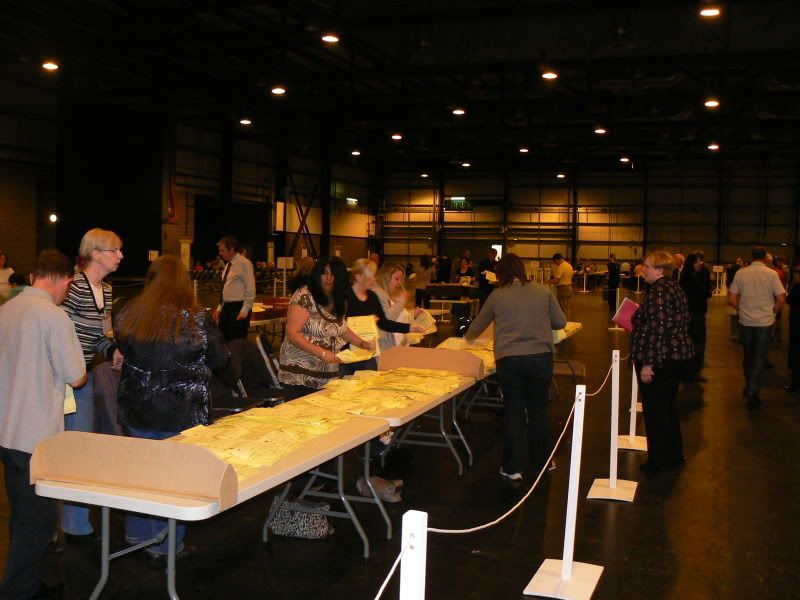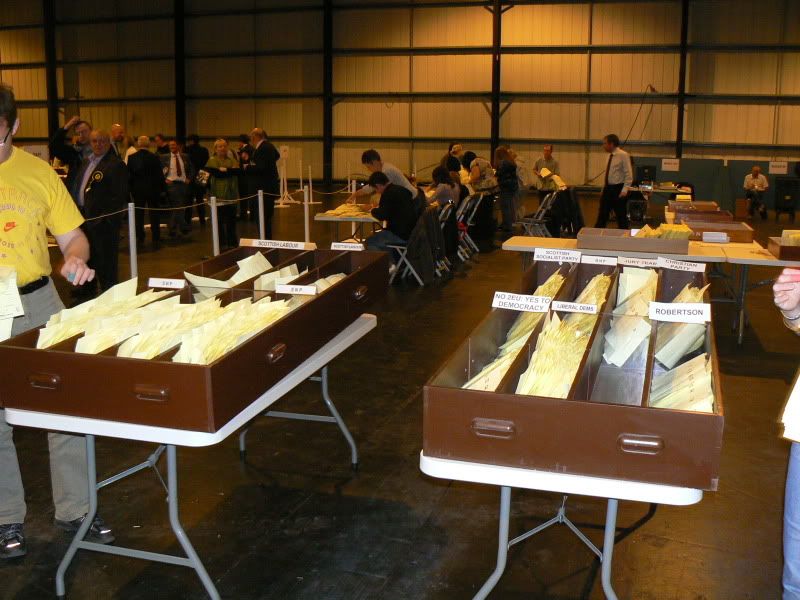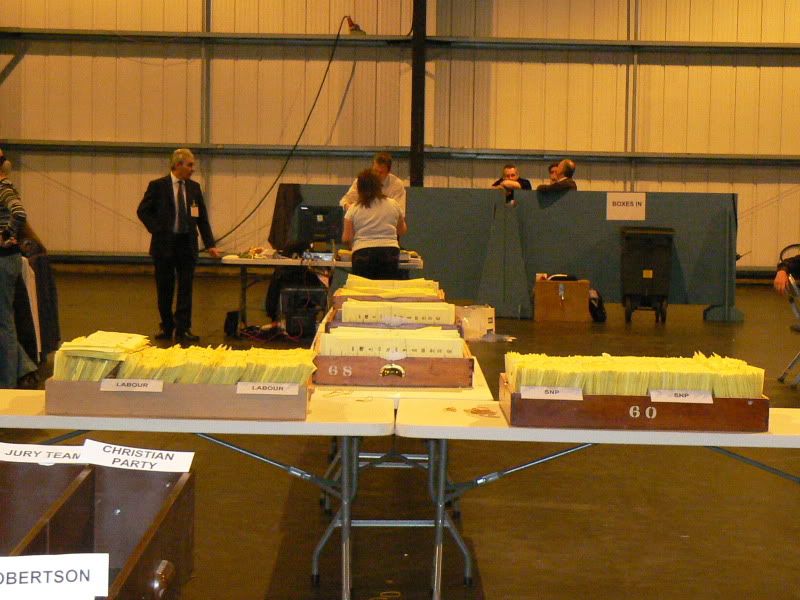The Euro Election Count at the SECC on Sunday evening was a bit of a strange experience, not least as I'm not used to such a time lag between election and result! There's a couple of phases of the count that people outside of the process might not know about, so I thought I'd give everyone a wee bit of a run-down of what actually happens at an election count.
I arrived at the count promptly at 5.30. The hall at the SECC was set up with separate areas for each Westminster constituency - despite the reality that this is the Euros and the result will be declared by local authority. It's useful for us as parties, as it gives us an indication of where we're doing well. Westminster is also the next election, so it's the most useful data we can get. For me as a Councillor, it makes things tricky. My ward is divided between three Westminster constituencies - Glasgow East, Central and North East - so I found it difficult to keep an eye on the ballot boxes from my ward at different ends of the hall!
It's important to watch the ballot boxes being opened for a couple of important reasons. You want to ensure that the boxes have arrived from the polling station sealed and untampered with until they are opened. You obseve that that there are no ballot papers left in the boxes. You check the box number, the polling district and the location, which are printed on the box. Oddly, ballot boxes are not a standard shape and size - when I was in Aberdeen, they were squat and square - Glasgow's are taller and look a bit like pedal bins.
 The boxes are emptied onto a table with two or three counting officials, who begin the job of unfolding and piling up the ballot papers. The Euro ones are pretty big, and I saw a couple of them tear. This stage is important to political activists - we do ballot box sampling, which gives an indication of our support in each box. I was very pleasantly surprised by the level of SNP support in my ward. The ballot papers from each box are counted, totalled, and verified against the ballot papers issued. They then go to a central pile, and the process continues until all the ballot boxes have been counted. During this, we sample, we monitor, we ensure that the count is being carried out properly.
The boxes are emptied onto a table with two or three counting officials, who begin the job of unfolding and piling up the ballot papers. The Euro ones are pretty big, and I saw a couple of them tear. This stage is important to political activists - we do ballot box sampling, which gives an indication of our support in each box. I was very pleasantly surprised by the level of SNP support in my ward. The ballot papers from each box are counted, totalled, and verified against the ballot papers issued. They then go to a central pile, and the process continues until all the ballot boxes have been counted. During this, we sample, we monitor, we ensure that the count is being carried out properly. Following this, the process of separating the pile of papers from each ballot box into piles for each party begins. With so many parties on the ballot paper, this took quite a while. It's important at this stage to ensure that there are no stray SNP votes going missing into the piles of other parties. It sounds simple, but the vote counters get increasingly tired and mistakes can happen.
Following this, the process of separating the pile of papers from each ballot box into piles for each party begins. With so many parties on the ballot paper, this took quite a while. It's important at this stage to ensure that there are no stray SNP votes going missing into the piles of other parties. It sounds simple, but the vote counters get increasingly tired and mistakes can happen.The piles are then collected into bundles of 100, and placed in a tray by party. It's really exciting to watch the votes literally pile up in front of you, but frustrating as you can't tell exactly how many are there.

Before the end, candidates and election agents get called over to go through the spoiled and invalid ballots. At the Glasgow count, there was enough room for hingers oan like me to peer over shoulders and have a look at these. Sometimes, people don't cast a vote. People make mistakes and vote twice. Some put their cross in an odd place which can be overlooked - for example, someone had circled a number next to one of the Green candidates, rather than crossing in the box. Since that was agreed among candidates and agents to be a clear preference, the vote was counted. What was striking was the number and the manner in which ballots were spoiled; I'm sure the number of deliberately spoiled ballots have increased. A good number of people had written things like "none worthy of my vote", "general election now", "corrupt". It's a clear message, and one no politician should ignore.
After this, all that remained was the declaration, and it was a long time coming! The result for the whole city was declared, and the constituencies distributed. They're now up on the the Glasgow City Council website if you fancy a bit more information. I was really pleased to see how close Glasgow Central had run (very tight, as you can see from the final picture!), delighted about Glasgow South and Glasgow North, and a little disappointed by the rest. It's a huge difference however from previous elections in Glasgow. The majorities for Westminster were eye-watering, but they vanished in the course of this election. This is more than just protest votes; people are switching, and when people switch, it changes the way they think about voting in every election after.
I'm delighted by the overall result for Scotland - as the Herald said this morning, this was no fluke.
Five years ago the SNP polled 231,505 votes in this election. This time round the figure was 321,007. For Labour to imagine that this was achieved simply by their own vote staying at home, or that switchers came only from the ranks of Tories and Liberal Democrats using the SNP as a protest vote, seemed fanciful.
2 comments:
Good description Belle. Have the SNP not got hand held computer thingies to do the sampling yet or is it still the paper and pencil gate method?
Hi subrosa! It's still paper and five bar gates, in Glasgow at least. Not sure hand held things would be an improvement, but it'd be nice to try that out. Thinking wireless transfers to a hub where numbers can be crunched!
Post a Comment